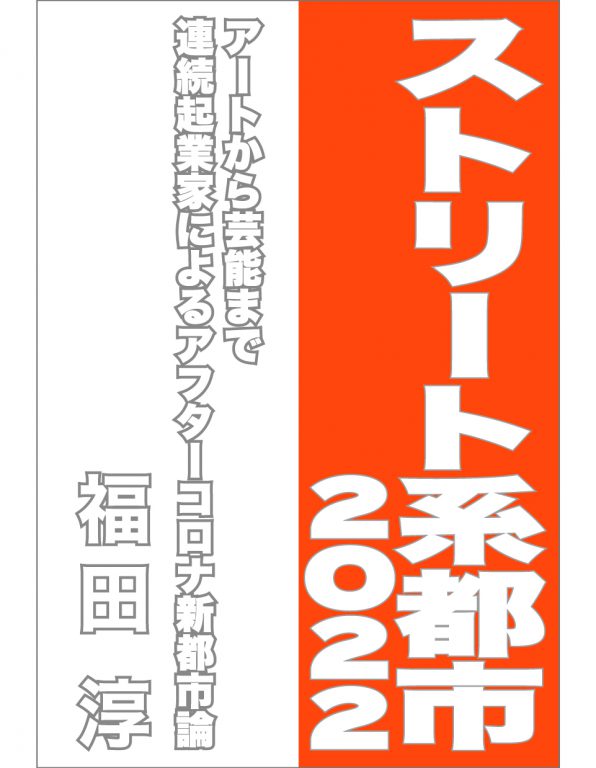Yukio Tachibanagawa note August 4, 2022 “Streetwise City 2022” by Jun Fukuda, B.

Mr. Yukio Tachibanagawa wrote a nice column about my new book. I also quoted from Mr. Tachibanagawa’s “The Age of Leisure” (2003). Thank you!
——————–
Yukio Tachibanagawa note
August 4, 2022 18:44
Streetwise City 2022,” by Jun Fukuda, Ph.
Now available on Amazon. (Also available for Kindle)
https://www.amazon.co.jp/dp/4771110662/
Cities as Media
After an unusually hot summer this year, today was a bit refreshing with the rain. After a while of meetings and consultations using Zoom in an air-conditioned room, I went for a walk toward Musashikoyama station and read Mr. Fukuda’s new book while drinking iced coffee at Ueshima Coffee.
Mr. Fukuda is anything and everything: a management company for “Non” and other unique talents, an e-book and digital content company, an art gallery in Los Angeles, a resort development in Okinawa, and a large-scale farm development. Although his day job is probably corporate consulting, the Fukuda we know is a serial entrepreneur who does everything himself. This book, too, is published by Speedy Publishing, which he created by acquiring a well-established publishing company. This allows him to publish freely, unrestricted by the old ways of the publishing industry, which is highly professional and full of unnecessary work. Self-publishing is common, but few people start their own publishing house to publish the books they want to write. This is truly a “self-publishing company. He has the spirit of “try anything,” and his management skills are not half bad, with none of his books ever going into the red.
This book is an urban theory. Mr. Fukuda has consistently lived in the media world, including the founding of Tohoku Shinsha, Sony Pictures Entertainment, and Sony Digital Entertainment, so the city as media.
In Corona, Mr. Fukuda says that the role of Tokyo is over and he has moved out of his office and moved to Okinawa, where he posts pictures on Facebook of himself playing with girls at the beach. I thought, “Oh, he’s already cut himself off from Tokyo”. He is a true genius.
2. Rural and Urban
I was born and raised in the city, so I have no countryside to return to. I have no relatives. When I murmured to my Niigata-born wife when I was young, “It would be nice to live in the countryside,” she told me, “You will never be able to live in the countryside.
When I visited Kochi City a long time ago, I went there without deciding where to stay and was wandering around on a country road when a local lady spoke to me and said, “Oh, I see, you don’t have a place to stay? (Laughs) Wherever you go in Japan, you are always welcomed as a guest. It must be the culture of the Malevito. But when it comes to living in Japan, I guess it is different.
The countryside is said to be welcoming to momentary visitors but exclusive to those who move here because a solid community has been established. Cities are artificial communities created by people who are tired of the feudal countryside or who do not see the potential in it. What does it mean to create a new community in a city made up of distant individuals? It cannot be done in a simple, linear fashion. How will the natural and the artificial merge?
When I was young, I read a book by Masanobu Fukuoka, a natural farmer, and what impressed me the most was not the crap about natural farming, but phrases like, “Humans are strange animals that are in the countryside and think of the city, and in the city and think of the countryside.
We are like a pendulum in motion, with the countryside and the city as the two centers of gravity. Will this pendulum eventually pick up speed and come to a halt in unison? That is what I was thinking as I read this book.
3. What you will discover in the city
When Mr. Fukuda was a businessman, he used to say “I’m afraid I have to give you back your word” for everything. I laughed when he first told me that one day his boss told him, “You don’t have to give back any more words to me. I am not Mr. Fukuda’s boss, but I have had many conversations with him during our long association, and it is true that he is like that (laughs).
This book is also about Mr. Fukuda’s interactions with many wonderful people and his own thoughts in those conversations. Mr. Fukuda is a person who takes the ideas and logic of others critically, returning their words.
Mr. Fukuda is a master of dialogue, able to talk with any person on any subject, and even now, he is engaged in dialogue with so many new people he meets that he wonders how he can make time for it despite his busy schedule.
But personally, the outstanding dialogue that Mr. Fukuda has had was when he and Sugar (Norimasa Sato), who was still a nobody, had frequent unproductive chats. That would have made a terrific YouTuber compilation now.
I sometimes wonder if what Mr. Fukuda is able to discover in the city is to encounter unknown possibilities. I think the street is a live stage where people are always in flux and the landscape is always changing.
@metakit #note
https://note.com/metakit/n/n4bc86c0d4c75





